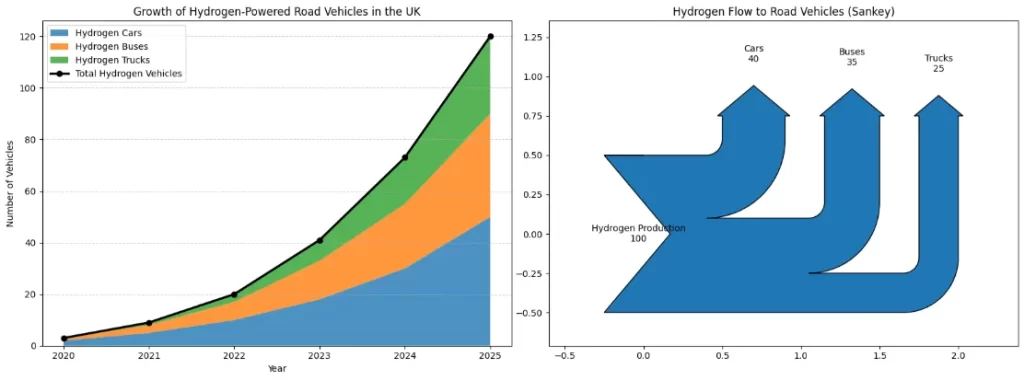How Hydrogen Fuels UK Are Driving Next-Gen Road Vehicles for Clean Transportation
Hydrogen fuels UK are crucial in changing the road transport sector toward a cleaner, zero-emission future. The UK government and industry partners are investing heavily in hydrogen fuel cell electric vehicles (FCEVs) and infrastructure. Hydrogen is becoming a key solution to lower transport emissions, improve air quality, and support the UK’s net-zero goals.
What Are Hydrogen Fuels UK and FCEVs?
Hydrogen fuels UK involve producing, distributing, and using hydrogen as a clean energy source for vehicles nationwide. Hydrogen fuel cell electric vehicles (FCEVs) create electricity by combining hydrogen gas with oxygen, producing only water vapor as a byproduct. This zero-emission technology provides a sustainable alternative to petrol and diesel vehicles, particularly for heavy-duty and long-range applications.
The Environmental and Operational Benefits of Hydrogen Fuels UK
Zero Tailpipe Emissions
Hydrogen FCEVs only emit water vapor. This significantly cuts down on greenhouse gases and harmful pollutants like nitrogen oxides and particulate matter, which contribute to urban air pollution.
Long Driving Range
Hydrogen vehicles can travel around 300 miles or more on a single tank, similar to conventional vehicles. This helps address range anxiety that often comes with battery electric vehicles (BEVs).
Fast Refuelling
Refuelling hydrogen vehicles takes just a few minutes, like petrol or diesel cars. This makes them practical for daily use and commercial operations.
Suitability for Heavy Vehicles
Hydrogen’s high energy density is ideal for heavy goods vehicles (HGVs), buses, emergency service vehicles, and commercial fleets that need long ranges and quick turnaround times.
UK Government and Industry Collaboration Driving Hydrogen Fuels UK
The UK government acknowledges hydrogen’s potential and has committed considerable funding and policy support to speed up the adoption of hydrogen fuels UK. For instance:
- A £23 million fund was announced to promote hydrogen-powered vehicles and infrastructure, aiding the rollout of refuelling stations and encouraging industry investment.
- The UKH2Mobility project, a partnership between government departments and industry sectors like automotive, energy, and infrastructure, has created a roadmap for commercialising hydrogen FCEVs in the UK. The goal is to have over 1.5 million hydrogen vehicles on UK roads by 2030.
- The Department for Transport’s Tees Valley Hydrogen Transport Hub is a flagship initiative aiming to establish a large-scale hydrogen production, storage, and refuelling network, positioning the UK as a leader in hydrogen transport.
Expanding Hydrogen Refuelling Infrastructure
A crucial factor in the success of hydrogen fuels UK is expanding refuelling stations. Industry and government are working together to build a nationwide network that ensures accessibility and convenience for hydrogen vehicle users. Developing this infrastructure is vital to overcome one of the main barriers to adopting hydrogen vehicles: the availability of refuelling options.
Hydrogen Fuels UK in Commercial and Agricultural Vehicles
Beyond passenger cars, hydrogen fuels UK are being explored for commercial and agricultural vehicles. Recent discussions are looking at using hydrogen-powered tractors, diggers, and forklifts on UK roads to help decarbonise key sectors like farming and construction. This expansion will broaden hydrogen’s impact on reducing emissions across the economy.
Challenges to Overcome for Hydrogen Fuels UK
Despite its promise, hydrogen fuels UK face several challenges:
- Cost and Affordability: Hydrogen FCEVs currently have higher upfront costs compared to conventional and battery electric vehicles, but prices are expected to drop with increased scale and technological improvement.
- Infrastructure Gaps: The hydrogen refuelling network is still limited, requiring significant investment to make it as convenient as petrol stations.
- Public Awareness and Market Acceptance: Educating consumers is needed to build understanding and confidence in hydrogen technology.
- Sustainable Hydrogen Production: The environmental benefits rely on producing hydrogen from low-carbon sources, such as green hydrogen from renewable electricity, rather than fossil fuels.
The Future Outlook for Hydrogen Fuels UK in Road Transport
The future for hydrogen fuels UK in road vehicles looks promising:
- Ongoing government funding and policy support will speed up infrastructure development and vehicle availability.
- Industry leaders like Toyota are actively promoting hydrogen FCEVs. Models like the Mirai are already on UK roads, with plans for more vehicles to hit the market.
- The combination of fast refuelling, long range, and zero emissions makes hydrogen a strong candidate to complement battery electric vehicles, especially for heavy-duty and commercial transport.
- Innovations in hydrogen storage, distribution, and vehicle technology will further lower costs and enhance performance.
Conclusion
Hydrogen fuels UK are leading the next generation of road vehicles by providing a clean, efficient, and practical alternative to fossil fuels. With strong government support, expanding infrastructure, and increasing industry commitment, hydrogen-powered vehicles are poised to play a vital role in the UK’s shift to sustainable, zero-emission transportation. This transition not only supports the UK’s climate goals but also promises economic growth and improved air quality for communities across the country.

Hydrogen Energy Case Studies & Resources
Explore these real-world applications and strategic documents about hydrogen technology:
Hydrogen Refuelling Case Studies
Fuel Cell Systems showcases practical implementations of hydrogen refuelling solutions across various industries.
Source: Fuel Cell Systems UKTees Valley Hydrogen Transport Project
A case study on hydrogen-powered transport initiatives in the Tees Valley region of the UK.
Source: CenexHydrogen-Powered HGV Innovation
Case study about an innovative hydrogen-powered heavy goods vehicle developed in Glasgow.
Source: Glasgow City of Science & InnovationUK Hydrogen Strategy
The official UK government publication outlining the national strategy for hydrogen energy development.
Source: UK GovernmentNote: These links are external resources and will take you to third-party websites.